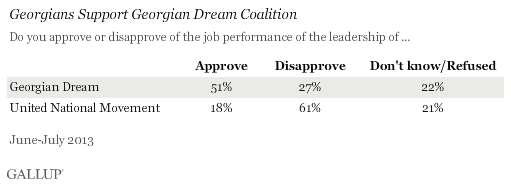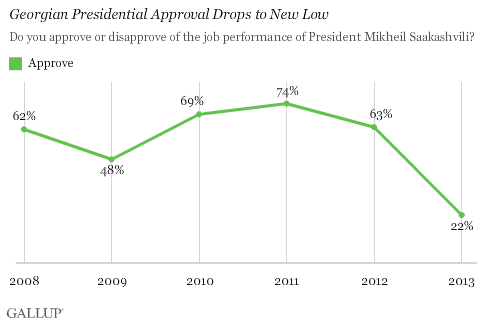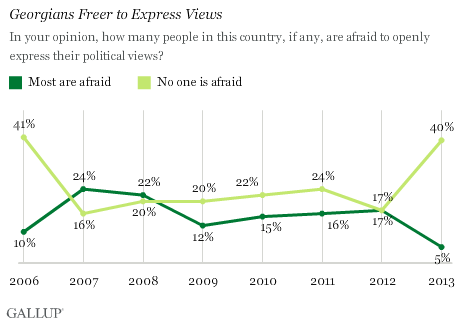WASHINGTON, D.C. -- Georgians head to the presidential polls this weekend firmly supporting the ruling Georgian Dream coalition over outgoing President Mikheil Saakashvili's United National Movement (UNM). This is a positive sign for Georgian Dream's leading candidate Georgy Margvelashvili, but it is another blow to the UNM, which lost in parliamentary elections in October 2012.

Saakashvili ends his presidency nearly as unpopular as the party that he was re-elected to lead this month. After years of enjoying majority support, 22% of Georgians in July approved of his job performance -- the lowest rating on record since Gallup began tracking it after his re-election in 2008.

The president's low approval rating coincides with more Georgians feeling free to voice their political views than they have in the past. Four in 10 Georgians now say no one in their country is afraid to express his or her political views, which is nearly double compared with the past several years. This is roughly on par with how Georgians felt before the government crackdown on demonstrations in 2007.

Implications
The pro-Western Saakashvili leaves office with few fans in Georgia and uncertain allies near and abroad. Questions remain about the next president's relations with the West and Russia and Georgia's intentions to join NATO, particularly after reports surfaced Tuesday that the country would not become a member in 2014.
For complete data sets or custom research from the more than 150 countries Gallup continually surveys, please contact us.
Survey Methods
Results are based on face-to-face interviews with 1,000 adults, aged 15 and older, conducted in June 19-July 9, 2013, in Georgia. For results based on the total sample of national adults, one can say with 95% confidence that the maximum margin of sampling error is ±3.6 percentage points. Surveys conducted with approximately 1,000 adults, aged 15 and older, between 2006 and 2013. The margin of error reflects the influence of data weighting. In addition to sampling error, question wording and practical difficulties in conducting surveys can introduce error or bias into the findings of public opinion polls.
For more complete methodology and specific survey dates, please review Gallup's Country Data Set details.
